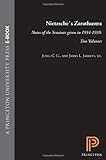Nietzsche's Zarathustra : Notes of the Seminar given in 1934-1939. Two Volumes / C. G. Jung; ed. by James L. Jarrett.
Material type: TextSeries: Jung Seminars ; 520Publisher: Princeton, NJ : Princeton University Press, [2012]Copyright date: ©1989Edition: Course BookDescription: 1 online resource (1616 p.)Content type:
TextSeries: Jung Seminars ; 520Publisher: Princeton, NJ : Princeton University Press, [2012]Copyright date: ©1989Edition: Course BookDescription: 1 online resource (1616 p.)Content type: - 9780691099538
- 9781400843107
- 193 22
- B3313.A44
- online - DeGruyter
| Item type | Current library | Call number | URL | Status | Notes | Barcode | |
|---|---|---|---|---|---|---|---|
 eBook
eBook
|
Biblioteca "Angelicum" Pont. Univ. S.Tommaso d'Aquino Nuvola online | online - DeGruyter (Browse shelf(Opens below)) | Online access | Not for loan (Accesso limitato) | Accesso per gli utenti autorizzati / Access for authorized users | (dgr)9781400843107 |
Frontmatter -- Table of Contents -- Introduction -- Acknowledgments -- A Note on the Text -- Members of the Seminar -- List of Bibliographic Abbreviations -- Spring Term. May / June 1934 -- Autumn Term. October / December 1934 -- Winter Term. January / March 1935 -- Spring Term. May / June 1935 -- Autumn Term. October / December 1935 -- Volume 2 -- Table of Contents vol 2 -- Winter Term. January / March 1936 -- Spring Term. May / June 1936 -- Spring Term. May / June 1937 -- Spring Term. May / June 1938 -- Autumn Term. October / December 1938 -- Winter Term. January / February 1939 -- References to the Psychological Analysis of Thus Spake Zarathustra by Chapter -- Index
restricted access online access with authorization star
http://purl.org/coar/access_right/c_16ec
As a young man growing up near Basel, Jung was fascinated and disturbed by tales of Nietzsche's brilliance, eccentricity, and eventual decline into permanent psychosis. These volumes, the transcript of a previously unpublished private seminar, reveal the fruits of his initial curiosity: Nietzsche's works, which he read as a student at the University of Basel, had moved him profoundly and had a lifelong influence on his thought. During the sessions the mature Jung spoke informally to members of his inner circle about a thinker whose works had not only overwhelmed him with the depth of their understanding of human nature but also provided the philosophical sources of many of his own psychological and metapsychological ideas. Above all, he demonstrated how the remarkable book Thus Spake Zarathustra illustrates both Nietzsche's genius and his neurotic and prepsychotic tendencies. Since there was at that time no thought of the seminar notes being published, Jung felt free to joke, to lash out at people and events that irritated or angered him, and to comment unreservedly on political, economic, and other public concerns of the time. This seminar and others, including the one recorded in Dream Analysis, were given in English in Zurich during the 1920s and 1930s.
Mode of access: Internet via World Wide Web.
In English.
Description based on online resource; title from PDF title page (publisher's Web site, viewed 03. Jan 2023)


